外研版(2019)必修第二册Unit2 Let's celebrate! Using language 课件(36张ppt)
文档属性
| 名称 | 外研版(2019)必修第二册Unit2 Let's celebrate! Using language 课件(36张ppt) |
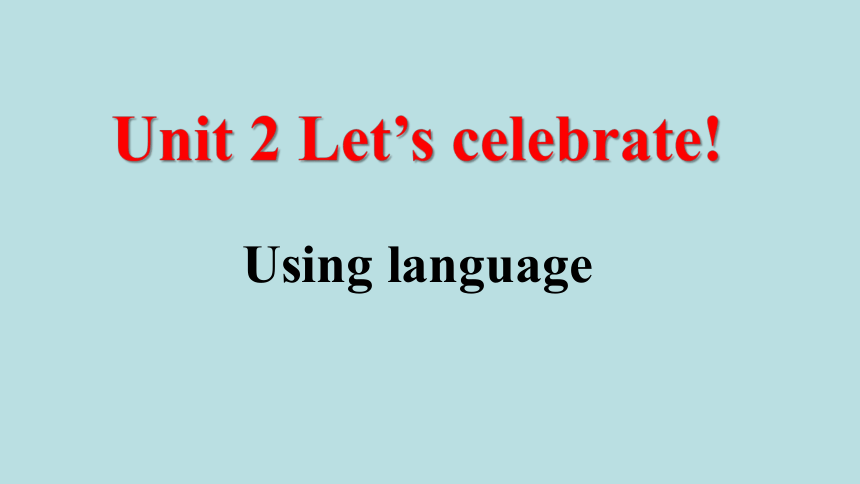
|
|
| 格式 | pptx | ||
| 文件大小 | 9.4MB | ||
| 资源类型 | 教案 | ||
| 版本资源 | 外研版(2019) | ||
| 科目 | 英语 | ||
| 更新时间 | 2023-02-27 00:00:00 | ||
图片预览

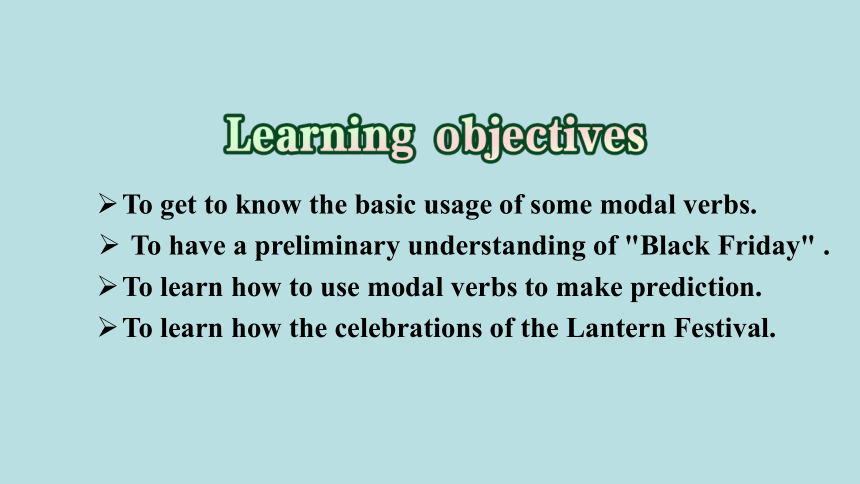
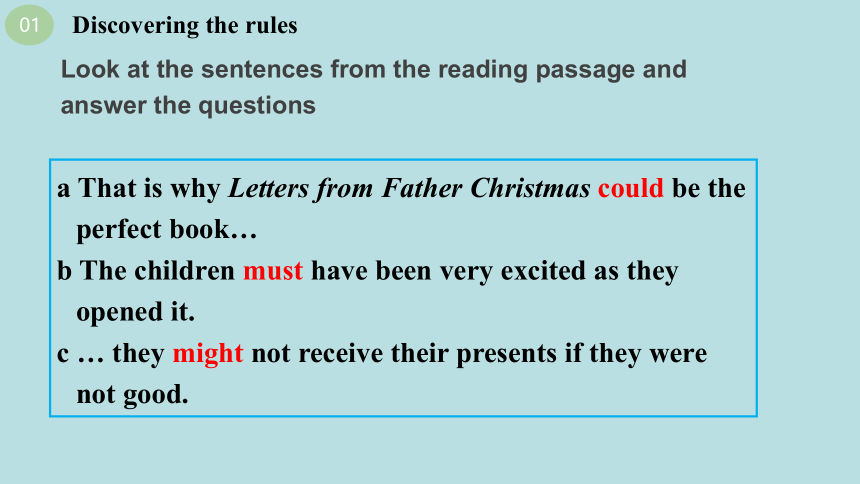
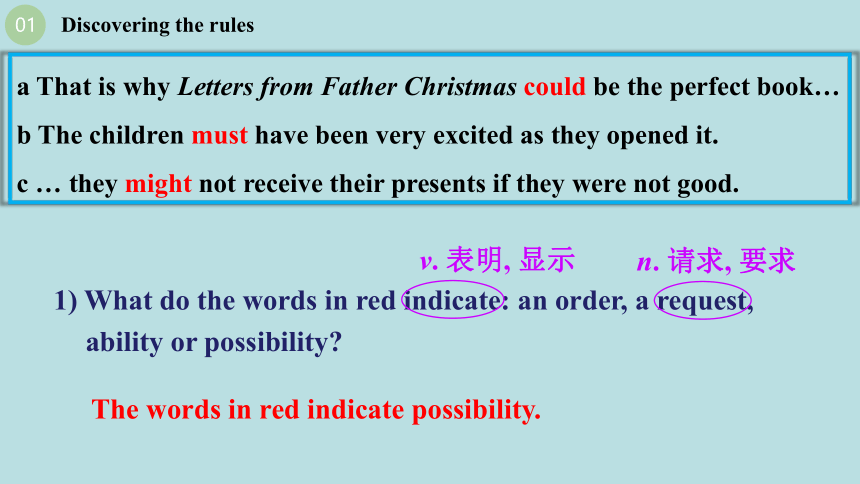
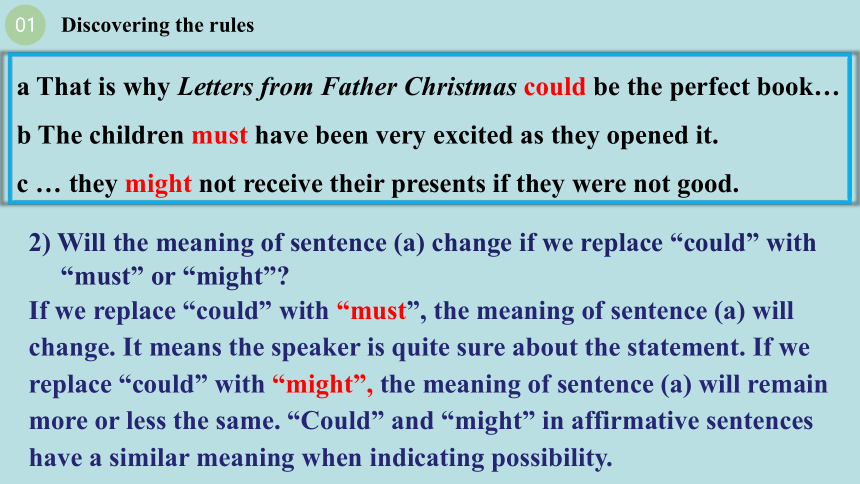
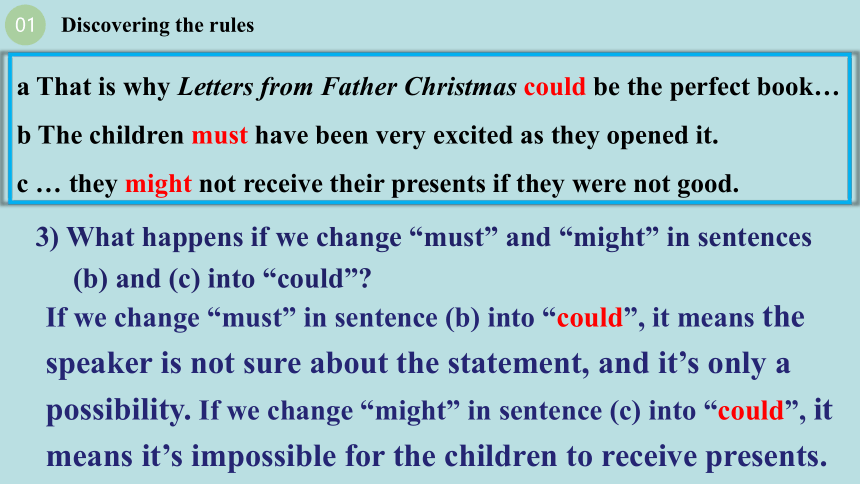
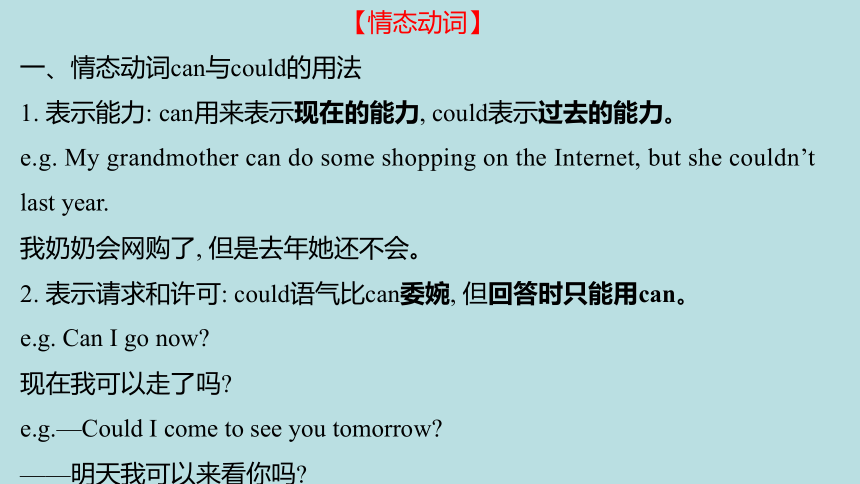
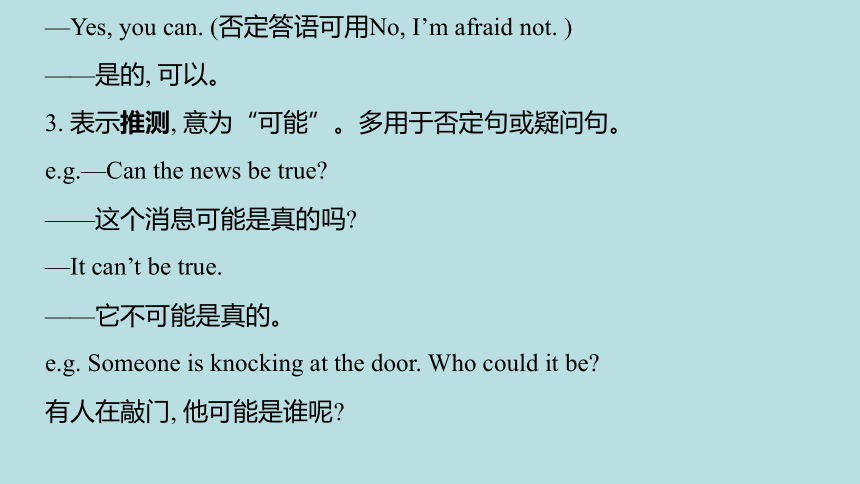
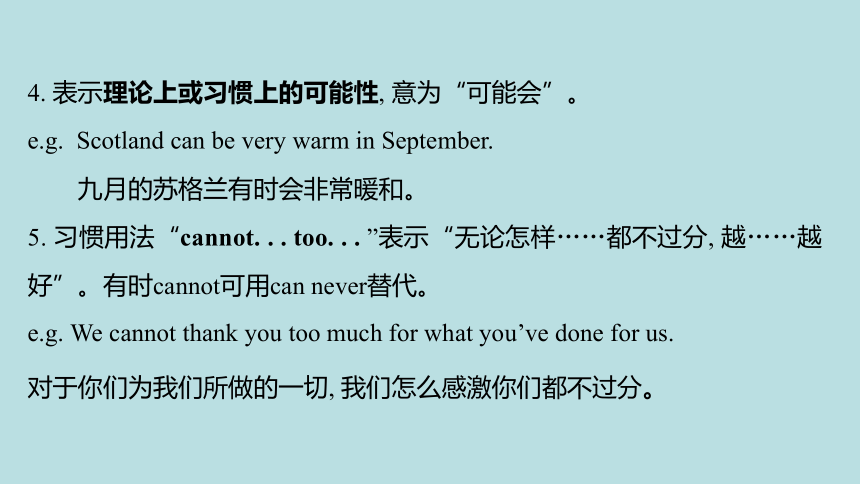
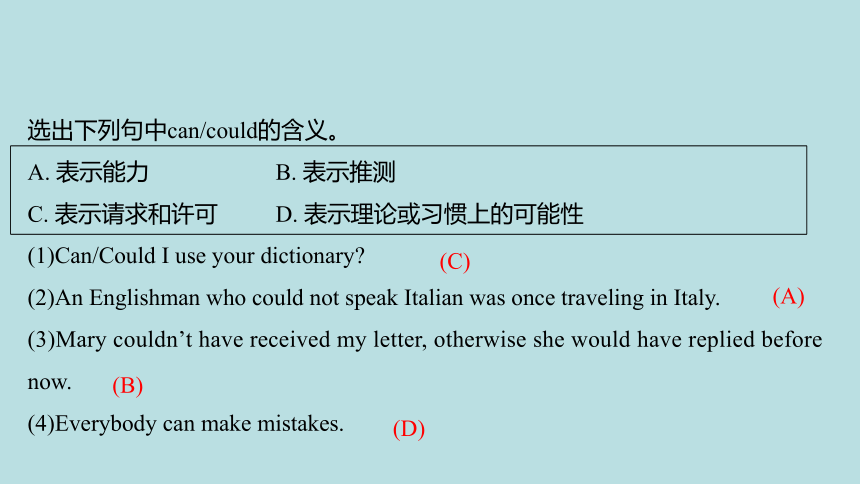
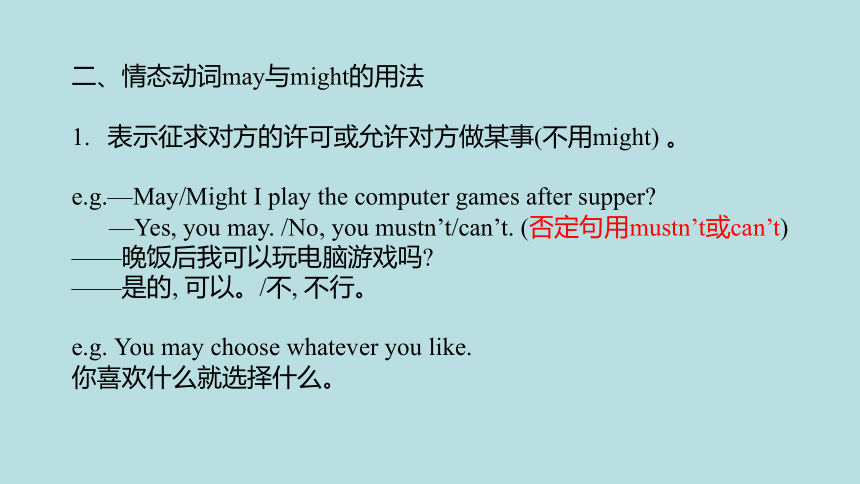
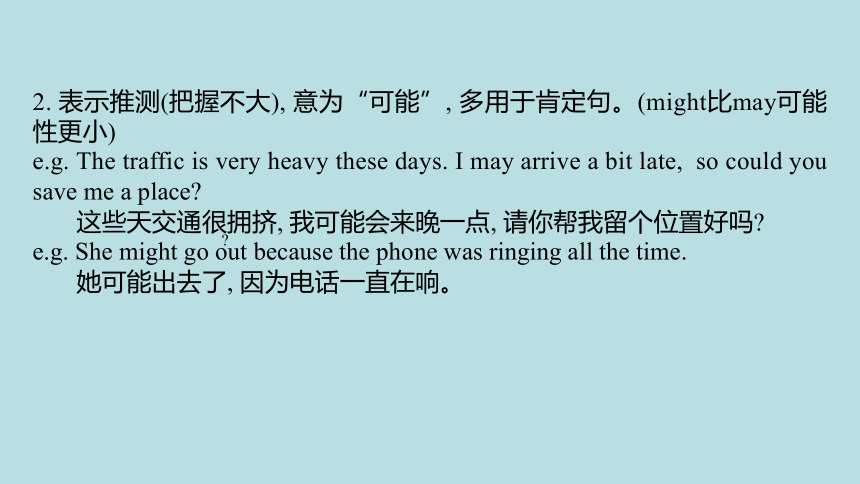
文档简介
(共36张PPT)
Unit 2 Let’s celebrate!
Using language
To get to know the basic usage of some modal verbs.
To have a preliminary understanding of "Black Friday" .
To learn how to use modal verbs to make prediction.
To learn how the celebrations of the Lantern Festival.
Look at the sentences from the reading passage and answer the questions.
a That is why Letters from Father Christmas could be the perfect book…
b The children must have been very excited as they opened it.
c … they might not receive their presents if they were not good.
01
Discovering the rules
1) What do the words in red indicate: an order, a request, ability or possibility
The words in red indicate possibility.
v. 表明, 显示
n. 请求, 要求
a That is why Letters from Father Christmas could be the perfect book…
b The children must have been very excited as they opened it.
c … they might not receive their presents if they were not good.
01
Discovering the rules
2) Will the meaning of sentence (a) change if we replace “could” with “must” or “might”
If we replace “could” with “must”, the meaning of sentence (a) will change. It means the speaker is quite sure about the statement. If we replace “could” with “might”, the meaning of sentence (a) will remain more or less the same. “Could” and “might” in affirmative sentences have a similar meaning when indicating possibility.
a That is why Letters from Father Christmas could be the perfect book…
b The children must have been very excited as they opened it.
c … they might not receive their presents if they were not good.
01
Discovering the rules
3) What happens if we change “must” and “might” in sentences (b) and (c) into “could”
If we change “must” in sentence (b) into “could”, it means the speaker is not sure about the statement, and it’s only a possibility. If we change “might” in sentence (c) into “could”, it means it’s impossible for the children to receive presents.
a That is why Letters from Father Christmas could be the perfect book…
b The children must have been very excited as they opened it.
c … they might not receive their presents if they were not good.
01
Discovering the rules
【情态动词】
一、情态动词can与could的用法
1. 表示能力: can用来表示现在的能力, could表示过去的能力。
e.g. My grandmother can do some shopping on the Internet, but she couldn’t last year.
我奶奶会网购了, 但是去年她还不会。
2. 表示请求和许可: could语气比can委婉, 但回答时只能用can。
e.g. Can I go now
现在我可以走了吗
e.g.—Could I come to see you tomorrow
——明天我可以来看你吗
—Yes, you can. (否定答语可用No, I’m afraid not. )
——是的, 可以。
3. 表示推测, 意为“可能”。多用于否定句或疑问句。
e.g.—Can the news be true
——这个消息可能是真的吗
—It can’t be true.
——它不可能是真的。
e.g. Someone is knocking at the door. Who could it be
有人在敲门, 他可能是谁呢
4. 表示理论上或习惯上的可能性, 意为“可能会”。
e.g. Scotland can be very warm in September.
九月的苏格兰有时会非常暖和。
5. 习惯用法“cannot. . . too. . . ”表示“无论怎样……都不过分, 越……越好”。有时cannot可用can never替代。
e.g. We cannot thank you too much for what you’ve done for us.
对于你们为我们所做的一切, 我们怎么感激你们都不过分。
选出下列句中can/could的含义。
A. 表示能力 B. 表示推测
C. 表示请求和许可 D. 表示理论或习惯上的可能性
(1)Can/Could I use your dictionary
(2)An Englishman who could not speak Italian was once traveling in Italy.
(3)Mary couldn’t have received my letter, otherwise she would have replied before now.
(4)Everybody can make mistakes.
(C)
(A)
(B)
(D)
二、情态动词may与might的用法
表示征求对方的许可或允许对方做某事(不用might) 。
e.g.—May/Might I play the computer games after supper
—Yes, you may. /No, you mustn’t/can’t. (否定句用mustn’t或can’t)
——晚饭后我可以玩电脑游戏吗
——是的, 可以。/不, 不行。
e.g. You may choose whatever you like.
你喜欢什么就选择什么。
2. 表示推测(把握不大), 意为“可能”, 多用于肯定句。(might比may可能性更小)
e.g. The traffic is very heavy these days. I may arrive a bit late, so could you save me a place
这些天交通很拥挤, 我可能会来晚一点, 请你帮我留个位置好吗
e.g. She might go out because the phone was ringing all the time.
她可能出去了, 因为电话一直在响。
3. may用于祈使句, 表示祝愿。
e.g. May you return soon.
愿你早日归来。
4. “may/might as well+动词原形”表示“不妨, 还不如”。
e.g. It’s not very far, so we may/might as well go on foot.
那地方不太远, 所以我们还是走着去吧。
选出下列句中may/might的含义。
A. 表示许可 B. 表示推测 C. 表示祝愿
(1)I think he may come tomorrow.
(2)May you good luck!
(3)May I watch TV now
(B)
(C)
(A)
三、情态动词must的用法
1. 表示“必须”, 语气比should, ought to强烈。其否定形式为mustn’t (不准; 禁止)。
e.g. You mustn’t do that, because you must keep your word.
你不能那么做, 因为你得遵守诺言。
表示肯定的推测时:
情态动词语气从弱到强依次为
might → may → could → can → must;
【要点提示】
以must开头的一般疑问句的肯定回答中要用must, 否定回答中要用needn’t/don’t have to。
e.g.—Must I finish the paper today
—Yes, you must. /No, you needn’t/don’t have to.
——今天我必须完成论文吗
——是的, 你必须。/不, 你不必。
2. 表示有把握的肯定推测, 只能用在肯定句中, 意为“一定; 准是”; 在否定句、疑问句中要用can’t代替。
e.g. You have worked hard all day. You must be tired.
你辛苦工作一整天了, 一定累了。(对现在情况的推测判断)
e.g. You must have read widely and put a lot of work into it.
你一定进行了广泛阅读并投入了大量的工作。(对过去情况的推测)
3. 表示感彩, 意为“偏偏; 偏要”, 常指令人不快的事情。
e.g. The car must break down just when I was about to start.
我正要出发时车偏偏抛锚了。
4. must not表示禁止, 意思是“不准” “不许” “千万不要”等。
e.g. You mustn’t drive into a street with a “no entry” sign.
你切勿把车驶进有“不得进入”标示的街道。
选出下列句中must/mustn’t的含义。
A. 表示“必须”
B. 表示“一定; 准是”
C. 表示“偏要; 硬要; 偏偏”
D. 表示“禁止, 不许, 不准”
(1)You mustn’t fire without my signal.
(2)Why must you always interrupt me
(3)You must be hungry after all that walking.
(4)You must practice your spoken English if you want to improve.
(D)
(C)
(B)
(A)
四、情态动词+have done
“can/could/may/might/must + have done”表示对过去事情的推测。各情态动词的表示推测的用法如下表:
形式 用法
must have done 过去肯定做过
can’t/ couldn’t have done 肯定没做过(否定句)
can/could+主语+have done 可能做过吗(疑问句)
may/might have done 或许/可能做过某事
From what you said, she must have told you all about it.
从你所说的来看, 她一定把一切都告诉你了。(只能用在肯定句中)
e.g. He can’t have finished the task in such a short time.
他不能在如此短的时间内完成这项任务。(只能用在否定句)
e.g. Can he have told you the secret yesterday
昨天他可能告诉过你那个秘密吗 (用在疑问句)
用适当的情态动词填空。
(1) He _____________ have forgotten it. I told him just now.
(2) It’s too late; I think he __________have gone to bed.
(3) Mary went home. She _____ have finished her work.
can’t/couldn’t
may/ might
must
情态动词+ have done”表示虚拟语气的用法:
could have done表示本来能够做某事但没做 (用于肯定句中)
should/ought to have done 表示本应该做某事但没做, 其否定式 表示本不该做但却做了
might have done表示本可以做某事但没做
needn’t have done表示本没有必要做某事但做了
e.g. You shouldn’t have told her the truth.
你本不该告诉她真相。
e.g. I could have given him some help, but I was busy then.
我本能够给他一些帮助, 但是当时太忙了。
e.g. You needn’t have come, it is Sunday.
你本没必要来, 今天是星期天。
Ⅰ. 用适当的情态动词填空
1. Where _________you have gone to I ________ find you just now.
2. You ____ take whatever you like.
3. You __________ as well stay where you are and it is easy for me to see you.
4. —_____ I hand in my homework tonight
—No, you _______. You ____ hand it in tomorrow.
5. He speaks English fluently. He _____ have learned English before.
6. May I come in Yes, you ____.
can/ could
couldn’t
may
may/might
Must
needn’t
can
must
may
7. You _____ be too careful to cross the road.
8. Generally speaking, it is warm in spring but it ____ be very cold in some bad
weather.
9. ____our friendship last long.
10. Why _____ you smoke in the meeting room
can’t
can
May
must
Ⅱ. 完成句子
1. It is cloudy and cold. It _________later this afternoon.
天气阴冷, 今天下午可能会下雪。
2. Don’t scold him for his mistake again. Anybody _________________.
不要因为他的错误再批评他了, 任何人都可能犯错误。
3. You ____________________here or you will be fined.
你禁止把车停在这里, 否则你会被罚款的。
4. The old man is so tired that he _______any farther.
这位老人非常累, 以至于再也不能走得更远了。
may snow
can make mistakes
mustn’t park your car
can’t go
5. —May I use your ruler —Sorry, you _____.
——我可以用用你的尺子吗 ——抱歉, 你不能。
6. —________________how to get to the hospital
——你能告诉我怎么到达医院吗
—Of course, I ____.
——当然能。
7. ________________every day!
愿你天天快乐!
can’t
Could you tell me
can
May you be happy
8. When you are tired, you __________________and have a rest.
当你累了, 不妨坐下来休息一下。
9. He is very friendly to everyone but sometimes he ___________________.
他对每个人非常友好, 但是有时他很固执。
10. He is a good student but he ___________play computer games.
他是个好学生,但是他偏偏喜欢玩电脑游戏。
may as well sit down
can be very stubborn
must like to
Grammar: Modals (2)
Look at the picture and make as many sentences as possible using can / could, may / might and must.
(P17)
Culture note : Black Friday
【P18】Underline the words and expressions about celebrations during the Lantern Festival in the speech bubbles and complete the mind map. Add any more you can think of.
Underline the words and expressions about celebrations
flowers, a scarf
a red envelope
rice balls
balloons
hold a lantern fair
hold a lantern riddles competition; let off fireworks
posters
Complete the mind map
Thank you
Unit 2 Let’s celebrate!
Using language
To get to know the basic usage of some modal verbs.
To have a preliminary understanding of "Black Friday" .
To learn how to use modal verbs to make prediction.
To learn how the celebrations of the Lantern Festival.
Look at the sentences from the reading passage and answer the questions.
a That is why Letters from Father Christmas could be the perfect book…
b The children must have been very excited as they opened it.
c … they might not receive their presents if they were not good.
01
Discovering the rules
1) What do the words in red indicate: an order, a request, ability or possibility
The words in red indicate possibility.
v. 表明, 显示
n. 请求, 要求
a That is why Letters from Father Christmas could be the perfect book…
b The children must have been very excited as they opened it.
c … they might not receive their presents if they were not good.
01
Discovering the rules
2) Will the meaning of sentence (a) change if we replace “could” with “must” or “might”
If we replace “could” with “must”, the meaning of sentence (a) will change. It means the speaker is quite sure about the statement. If we replace “could” with “might”, the meaning of sentence (a) will remain more or less the same. “Could” and “might” in affirmative sentences have a similar meaning when indicating possibility.
a That is why Letters from Father Christmas could be the perfect book…
b The children must have been very excited as they opened it.
c … they might not receive their presents if they were not good.
01
Discovering the rules
3) What happens if we change “must” and “might” in sentences (b) and (c) into “could”
If we change “must” in sentence (b) into “could”, it means the speaker is not sure about the statement, and it’s only a possibility. If we change “might” in sentence (c) into “could”, it means it’s impossible for the children to receive presents.
a That is why Letters from Father Christmas could be the perfect book…
b The children must have been very excited as they opened it.
c … they might not receive their presents if they were not good.
01
Discovering the rules
【情态动词】
一、情态动词can与could的用法
1. 表示能力: can用来表示现在的能力, could表示过去的能力。
e.g. My grandmother can do some shopping on the Internet, but she couldn’t last year.
我奶奶会网购了, 但是去年她还不会。
2. 表示请求和许可: could语气比can委婉, 但回答时只能用can。
e.g. Can I go now
现在我可以走了吗
e.g.—Could I come to see you tomorrow
——明天我可以来看你吗
—Yes, you can. (否定答语可用No, I’m afraid not. )
——是的, 可以。
3. 表示推测, 意为“可能”。多用于否定句或疑问句。
e.g.—Can the news be true
——这个消息可能是真的吗
—It can’t be true.
——它不可能是真的。
e.g. Someone is knocking at the door. Who could it be
有人在敲门, 他可能是谁呢
4. 表示理论上或习惯上的可能性, 意为“可能会”。
e.g. Scotland can be very warm in September.
九月的苏格兰有时会非常暖和。
5. 习惯用法“cannot. . . too. . . ”表示“无论怎样……都不过分, 越……越好”。有时cannot可用can never替代。
e.g. We cannot thank you too much for what you’ve done for us.
对于你们为我们所做的一切, 我们怎么感激你们都不过分。
选出下列句中can/could的含义。
A. 表示能力 B. 表示推测
C. 表示请求和许可 D. 表示理论或习惯上的可能性
(1)Can/Could I use your dictionary
(2)An Englishman who could not speak Italian was once traveling in Italy.
(3)Mary couldn’t have received my letter, otherwise she would have replied before now.
(4)Everybody can make mistakes.
(C)
(A)
(B)
(D)
二、情态动词may与might的用法
表示征求对方的许可或允许对方做某事(不用might) 。
e.g.—May/Might I play the computer games after supper
—Yes, you may. /No, you mustn’t/can’t. (否定句用mustn’t或can’t)
——晚饭后我可以玩电脑游戏吗
——是的, 可以。/不, 不行。
e.g. You may choose whatever you like.
你喜欢什么就选择什么。
2. 表示推测(把握不大), 意为“可能”, 多用于肯定句。(might比may可能性更小)
e.g. The traffic is very heavy these days. I may arrive a bit late, so could you save me a place
这些天交通很拥挤, 我可能会来晚一点, 请你帮我留个位置好吗
e.g. She might go out because the phone was ringing all the time.
她可能出去了, 因为电话一直在响。
3. may用于祈使句, 表示祝愿。
e.g. May you return soon.
愿你早日归来。
4. “may/might as well+动词原形”表示“不妨, 还不如”。
e.g. It’s not very far, so we may/might as well go on foot.
那地方不太远, 所以我们还是走着去吧。
选出下列句中may/might的含义。
A. 表示许可 B. 表示推测 C. 表示祝愿
(1)I think he may come tomorrow.
(2)May you good luck!
(3)May I watch TV now
(B)
(C)
(A)
三、情态动词must的用法
1. 表示“必须”, 语气比should, ought to强烈。其否定形式为mustn’t (不准; 禁止)。
e.g. You mustn’t do that, because you must keep your word.
你不能那么做, 因为你得遵守诺言。
表示肯定的推测时:
情态动词语气从弱到强依次为
might → may → could → can → must;
【要点提示】
以must开头的一般疑问句的肯定回答中要用must, 否定回答中要用needn’t/don’t have to。
e.g.—Must I finish the paper today
—Yes, you must. /No, you needn’t/don’t have to.
——今天我必须完成论文吗
——是的, 你必须。/不, 你不必。
2. 表示有把握的肯定推测, 只能用在肯定句中, 意为“一定; 准是”; 在否定句、疑问句中要用can’t代替。
e.g. You have worked hard all day. You must be tired.
你辛苦工作一整天了, 一定累了。(对现在情况的推测判断)
e.g. You must have read widely and put a lot of work into it.
你一定进行了广泛阅读并投入了大量的工作。(对过去情况的推测)
3. 表示感彩, 意为“偏偏; 偏要”, 常指令人不快的事情。
e.g. The car must break down just when I was about to start.
我正要出发时车偏偏抛锚了。
4. must not表示禁止, 意思是“不准” “不许” “千万不要”等。
e.g. You mustn’t drive into a street with a “no entry” sign.
你切勿把车驶进有“不得进入”标示的街道。
选出下列句中must/mustn’t的含义。
A. 表示“必须”
B. 表示“一定; 准是”
C. 表示“偏要; 硬要; 偏偏”
D. 表示“禁止, 不许, 不准”
(1)You mustn’t fire without my signal.
(2)Why must you always interrupt me
(3)You must be hungry after all that walking.
(4)You must practice your spoken English if you want to improve.
(D)
(C)
(B)
(A)
四、情态动词+have done
“can/could/may/might/must + have done”表示对过去事情的推测。各情态动词的表示推测的用法如下表:
形式 用法
must have done 过去肯定做过
can’t/ couldn’t have done 肯定没做过(否定句)
can/could+主语+have done 可能做过吗(疑问句)
may/might have done 或许/可能做过某事
From what you said, she must have told you all about it.
从你所说的来看, 她一定把一切都告诉你了。(只能用在肯定句中)
e.g. He can’t have finished the task in such a short time.
他不能在如此短的时间内完成这项任务。(只能用在否定句)
e.g. Can he have told you the secret yesterday
昨天他可能告诉过你那个秘密吗 (用在疑问句)
用适当的情态动词填空。
(1) He _____________ have forgotten it. I told him just now.
(2) It’s too late; I think he __________have gone to bed.
(3) Mary went home. She _____ have finished her work.
can’t/couldn’t
may/ might
must
情态动词+ have done”表示虚拟语气的用法:
could have done表示本来能够做某事但没做 (用于肯定句中)
should/ought to have done 表示本应该做某事但没做, 其否定式 表示本不该做但却做了
might have done表示本可以做某事但没做
needn’t have done表示本没有必要做某事但做了
e.g. You shouldn’t have told her the truth.
你本不该告诉她真相。
e.g. I could have given him some help, but I was busy then.
我本能够给他一些帮助, 但是当时太忙了。
e.g. You needn’t have come, it is Sunday.
你本没必要来, 今天是星期天。
Ⅰ. 用适当的情态动词填空
1. Where _________you have gone to I ________ find you just now.
2. You ____ take whatever you like.
3. You __________ as well stay where you are and it is easy for me to see you.
4. —_____ I hand in my homework tonight
—No, you _______. You ____ hand it in tomorrow.
5. He speaks English fluently. He _____ have learned English before.
6. May I come in Yes, you ____.
can/ could
couldn’t
may
may/might
Must
needn’t
can
must
may
7. You _____ be too careful to cross the road.
8. Generally speaking, it is warm in spring but it ____ be very cold in some bad
weather.
9. ____our friendship last long.
10. Why _____ you smoke in the meeting room
can’t
can
May
must
Ⅱ. 完成句子
1. It is cloudy and cold. It _________later this afternoon.
天气阴冷, 今天下午可能会下雪。
2. Don’t scold him for his mistake again. Anybody _________________.
不要因为他的错误再批评他了, 任何人都可能犯错误。
3. You ____________________here or you will be fined.
你禁止把车停在这里, 否则你会被罚款的。
4. The old man is so tired that he _______any farther.
这位老人非常累, 以至于再也不能走得更远了。
may snow
can make mistakes
mustn’t park your car
can’t go
5. —May I use your ruler —Sorry, you _____.
——我可以用用你的尺子吗 ——抱歉, 你不能。
6. —________________how to get to the hospital
——你能告诉我怎么到达医院吗
—Of course, I ____.
——当然能。
7. ________________every day!
愿你天天快乐!
can’t
Could you tell me
can
May you be happy
8. When you are tired, you __________________and have a rest.
当你累了, 不妨坐下来休息一下。
9. He is very friendly to everyone but sometimes he ___________________.
他对每个人非常友好, 但是有时他很固执。
10. He is a good student but he ___________play computer games.
他是个好学生,但是他偏偏喜欢玩电脑游戏。
may as well sit down
can be very stubborn
must like to
Grammar: Modals (2)
Look at the picture and make as many sentences as possible using can / could, may / might and must.
(P17)
Culture note : Black Friday
【P18】Underline the words and expressions about celebrations during the Lantern Festival in the speech bubbles and complete the mind map. Add any more you can think of.
Underline the words and expressions about celebrations
flowers, a scarf
a red envelope
rice balls
balloons
hold a lantern fair
hold a lantern riddles competition; let off fireworks
posters
Complete the mind map
Thank you
